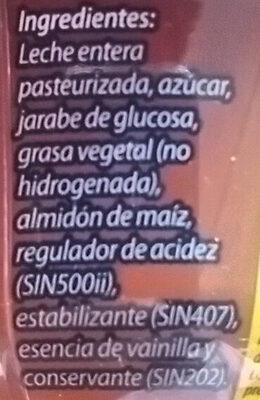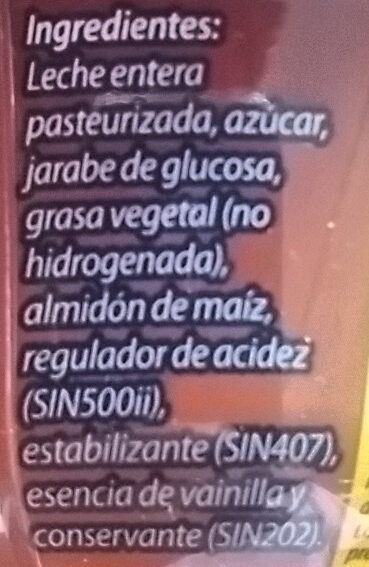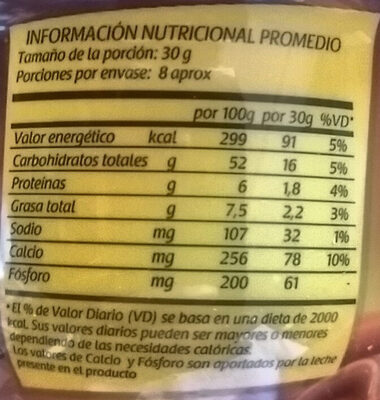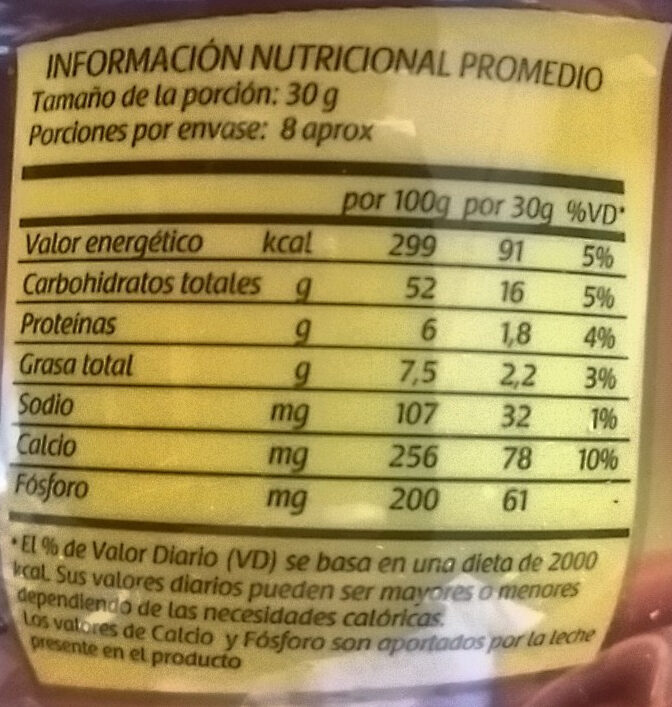Help us make food transparency the norm!
As a non-profit organization, we depend on your donations to continue informing consumers around the world about what they eat.
The food revolution starts with you!
Dulce de Leche - Pil - 250 g
Dulce de Leche - Pil - 250 g
This product page is not complete. You can help to complete it by editing it and adding more data from the photos we have, or by taking more photos using the app for Android or iPhone/iPad. Thank you!
×
Barcode: 7772905000029 (EAN / EAN-13)
Quantity: 250 g
Packaging: Plastic, PP 5 - Polypropylene, Jar
Brands: Pil
Categories: Breakfasts, Spreads, Sweet spreads, Milk jams
Labels, certifications, awards: es:Hecho en Bolivia
Origin of ingredients: Bolivia
Manufacturing or processing places: Quillacollo, Cochabamba, Bolivia
Link to the product page on the official site of the producer: https://pilandina.com.bo/producto/dulce-...
Stores: Farmacorp, Bodegas Pil, Pil Express
Countries where sold: Bolivia
Matching with your preferences
Health
Ingredients
-
12 ingredients
: Leche entera pasteurizada, azúcar, jarabe de glucosa, grasa vegetal no hidrogenada, almidón de maíz, regulador de acidez (SIN500ii), estabilizante (SIN407), esencia de vainilla, conservante (SIN202).Allergens: Milk
Food processing
-
Ultra processed foods
Elements that indicate the product is in the 4 - Ultra processed food and drink products group:
- Additive: E407 - Carrageenan
- Ingredient: Glucose
- Ingredient: Glucose syrup
Food products are classified into 4 groups according to their degree of processing:
- Unprocessed or minimally processed foods
- Processed culinary ingredients
- Processed foods
- Ultra processed foods
The determination of the group is based on the category of the product and on the ingredients it contains.
Additives
-
E202 - Potassium sorbate
Potassium sorbate (E202) is a synthetic food preservative commonly used to extend the shelf life of various food products.
It works by inhibiting the growth of molds, yeast, and some bacteria, preventing spoilage. When added to foods, it helps maintain their freshness and quality.
Some studies have shown that when combined with nitrites, potassium sorbate have genotoxic activity in vitro. However, potassium sorbate is generally recognized as safe (GRAS) by regulatory authorities.
-
E407 - Carrageenan
Carrageenan (E407), derived from red seaweed, is widely employed in the food industry as a gelling, thickening, and stabilizing agent, notably in dairy and meat products.
It can exist in various forms, each imparting distinct textural properties to food.
However, its degraded form, often referred to as poligeenan, has raised health concerns due to its potential inflammatory effects and its classification as a possible human carcinogen (Group 2B) by the International Agency for Research on Cancer (IARC).
Nevertheless, food-grade carrageenan has been deemed safe by various regulatory bodies when consumed in amounts typically found in food.
-
E500 - Sodium carbonates
Sodium carbonates (E500) are compounds commonly used in food preparation as leavening agents, helping baked goods rise by releasing carbon dioxide when they interact with acids.
Often found in baking soda, they regulate the pH of food, preventing it from becoming too acidic or too alkaline. In the culinary world, sodium carbonates can also enhance the texture and structure of foods, such as noodles, by modifying the gluten network.
Generally recognized as safe, sodium carbonates are non-toxic when consumed in typical amounts found in food.
-
E500ii - Sodium hydrogen carbonate
Sodium hydrogen carbonate, also known as E500ii, is a food additive commonly used as a leavening agent.
When added to recipes, it releases carbon dioxide gas upon exposure to heat or acids, causing dough to rise and resulting in a light, fluffy texture in baked goods.
It is generally recognized as safe (GRAS) by regulatory authorities when used in appropriate quantities and poses no significant health risks when consumed in typical food applications.
Ingredients analysis
-
May contain palm oil
Ingredients that may contain palm oil: Vegetable fat
-
Non-vegan
Non-vegan ingredients: Pasteurised whole milk
-
Vegetarian
No non-vegetarian ingredients detected
-
Details of the analysis of the ingredients
: Leche entera pasteurizada, azúcar, jarabe de glucosa, grasa vegetal no hidrogenada, almidón de maíz, regulador de acidez (e500ii), estabilizante (e407), esencia de vainilla, conservante (e202)- Leche entera pasteurizada -> en:pasteurised-whole-milk - vegan: no - vegetarian: yes - ciqual_food_code: 19024 - percent_min: 11.1111111111111 - percent_max: 100
- azúcar -> en:sugar - vegan: yes - vegetarian: yes - ciqual_proxy_food_code: 31016 - percent_min: 0 - percent_max: 50
- jarabe de glucosa -> en:glucose-syrup - vegan: yes - vegetarian: yes - ciqual_proxy_food_code: 31016 - percent_min: 0 - percent_max: 33.3333333333333
- grasa vegetal no hidrogenada -> en:vegetable-fat - vegan: yes - vegetarian: yes - from_palm_oil: maybe - percent_min: 0 - percent_max: 25
- almidón de maíz -> en:corn-starch - vegan: yes - vegetarian: yes - ciqual_food_code: 9510 - percent_min: 0 - percent_max: 20
- regulador de acidez -> en:acidity-regulator - percent_min: 0 - percent_max: 16.6666666666667
- e500ii -> en:e500ii - vegan: yes - vegetarian: yes - percent_min: 0 - percent_max: 16.6666666666667
- estabilizante -> en:stabiliser - percent_min: 0 - percent_max: 14.2857142857143
- e407 -> en:e407 - vegan: yes - vegetarian: yes - percent_min: 0 - percent_max: 14.2857142857143
- esencia de vainilla -> en:vanilla-extract - vegan: yes - vegetarian: yes - ciqual_food_code: 11065 - percent_min: 0 - percent_max: 12.5
- conservante -> en:preservative - percent_min: 0 - percent_max: 11.1111111111111
- e202 -> en:e202 - vegan: yes - vegetarian: yes - percent_min: 0 - percent_max: 11.1111111111111
Nutrition
-
Missing data to compute the Nutri-Score
Missing nutrition facts
⚠ ️The nutrition facts of the product must be specified in order to compute the Nutri-Score.Could you add the information needed to compute the Nutri-Score? Add nutrition facts
-
Nutrient levels
-
Fat in moderate quantity (7.5%)
What you need to know- A high consumption of fat, especially saturated fats, can raise cholesterol, which increases the risk of heart diseases.
Recommendation: Limit the consumption of fat and saturated fat- Choose products with lower fat and saturated fat content.
-
Salt in low quantity (0.268%)
What you need to know- A high consumption of salt (or sodium) can cause raised blood pressure, which can increase the risk of heart disease and stroke.
- Many people who have high blood pressure do not know it, as there are often no symptoms.
- Most people consume too much salt (on average 9 to 12 grams per day), around twice the recommended maximum level of intake.
Recommendation: Limit the consumption of salt and salted food- Reduce the quantity of salt used when cooking, and don't salt again at the table.
- Limit the consumption of salty snacks and choose products with lower salt content.
-
-
Nutrition facts
Nutrition facts As sold
for 100 g / 100 mlAs sold
per serving (30 g)Compared to: Milk jams Energy 1,251 kj
(299 kcal)375 kj
(89 kcal)+1% Fat 7.5 g 2.25 g +28% Saturated fat - - Carbohydrates 52 g 15.6 g -5% Sugars - - Fiber - - Proteins 6 g 1.8 g -5% Salt 0.268 g 0.08 g -17% Calcium 256 mg 76.8 mg +12% Phosphorus 200 mg 60 mg Fruits‚ vegetables‚ nuts and rapeseed‚ walnut and olive oils (estimate from ingredients list analysis) 0 % 0 %
Environment
-
Eco-Score B - Low environmental impact
⚠ ️Select a country in order to include the full impact of transportation.The Eco-Score is an experimental score that summarizes the environmental impacts of food products.→ The Eco-Score was initially developped for France and it is being extended to other European countries. The Eco-Score formula is subject to change as it is regularly improved to make it more precise and better suited to each country.Life cycle analysis
-
Average impact of products of the same category: A (Score: 88/100)
Category: Dulce de leche or confiture de lait
Category: Dulce de leche or confiture de lait
- PEF environmental score: 0.21 (the lower the score, the lower the impact)
- including impact on climate change: 1.77 kg CO2 eq/kg of product
Stage Impact Agriculture
45.9 %Processing
17.6 %Packaging
26.3 %Transportation
6.7 %Distribution
2.3 %Consumption
1.2 %
Bonuses and maluses
-
Origins of ingredients with a high impact
Malus: -5
Environmental policy: -5
Transportation: 0
Origin of the product and/or its ingredients % of ingredients Impact Bolivia 100 %High
-
Packaging with a medium impact
Malus: -12
Shape Material Recycling Impact 1 Jar PP 5 - Polypropylene High 1 Lid Plastic High 1 Film Light aluminium Medium 1 Label Plastic High ⚠ ️ The information about the packaging of this product is not sufficiently precise (exact shapes and materials of all components of the packaging).⚠ ️ For a more precise calculation of the Eco-Score, you can modify the product page and add them.
If you are the manufacturer of this product, you can send us the information with our free platform for producers.
Eco-Score for this product
-
Impact for this product: B (Score: 71/100)
Product: Dulce de Leche - Pil - 250 g
Life cycle analysis score: 88
Sum of bonuses and maluses: -17
Final score: 71/100
-
Carbon footprint
-
Equal to driving 0.9 km in a petrol car
177 g CO² per 100g of product
The carbon emission figure comes from ADEME's Agribalyse database, for the category: Dulce de leche or confiture de lait (Source: ADEME Agribalyse Database)
Stage Impact Agriculture
46.2 %Processing
12.5 %Packaging
29.7 %Transportation
10.1 %Distribution
1.1 %Consumption
0.4 %
Packaging
-
Packaging with a medium impact
-
Packaging parts
1 x Jar (PP 5 - Polypropylene)
1 x Lid (Plastic)
1 x Film (Aluminium)
1 x Label (Plastic)
-
Packaging materials
Material % Packaging weight Packaging weight per 100 g of product Plastic Metal Total
-
Transportation
-
Origins of ingredients
Origins of ingredients with a high impact
Origin of the product and/or its ingredients % of ingredients Impact Bolivia 100 %High
Report a problem
-
Incomplete or incorrect information?
Category, labels, ingredients, allergens, nutritional information, photos etc.
If the information does not match the information on the packaging, please complete or correct it. Open Food Facts is a collaborative database, and every contribution is useful for all.
Data sources
Product added on by 5m4u9
Last edit of product page on by 5m4u9.
Product page also edited by ecoscore-impact-estimator, openfoodfacts-contributors, packbot.










